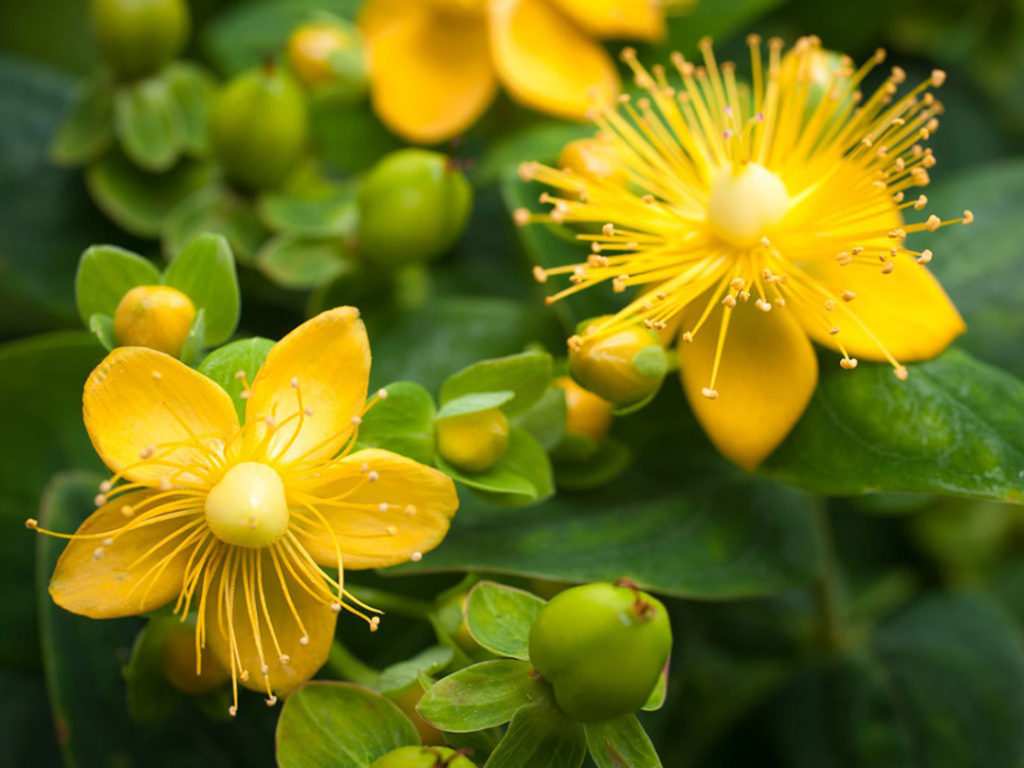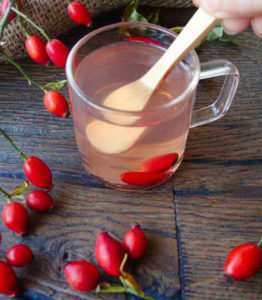(St John’s Wort, Citrus, Vitamin C and Rose Hips)
Having experienced the snow and heavy rains so soon this year we are headed for what is classically called the “dark of winter.” This is the time when the ice settles in and stories are told to pass the time and cultures to the next generation. Keep reading and learn how to beat the winter blues with tea, herbs, oils, and other plants.
 Most of my friends reach for St. John’s Wort (Hypericum perforatum) for their winter blues but that can be dangerous if taking certain medications. St. John’s Wort is always best taken if prescribed by a Naturopathic Dr or with your Dr.’s ok. My mom’s Cancer Dr. warned us that mom could not have St. John’s Wort as it is known to cancel out important medications. More tests are being done by medical researchers on the evidence of long-term safety or efficacy of St. John’s Wort. See https://www.nccih.nih.gov/health/st-johns-wort-and-depression-in-depth
Most of my friends reach for St. John’s Wort (Hypericum perforatum) for their winter blues but that can be dangerous if taking certain medications. St. John’s Wort is always best taken if prescribed by a Naturopathic Dr or with your Dr.’s ok. My mom’s Cancer Dr. warned us that mom could not have St. John’s Wort as it is known to cancel out important medications. More tests are being done by medical researchers on the evidence of long-term safety or efficacy of St. John’s Wort. See https://www.nccih.nih.gov/health/st-johns-wort-and-depression-in-depth
There are plants, teas, and essential oils that can help uplift your mood, answer the question of how to beat the winter blues, and give a little boost to help you get through that bump that is not as aggressive as St. John’s Wort. Let’s take a look at a couple of plant sources that can be a helpful tool during the blahs of winter and learn how to beat the winter blues.
How to beat the winter blues with citrus
Citrus is uplifting energy that our brain recognizes. No matter if it’s through factory sources or the absorption of vitamin C it can change our moods for the better. Vitamin C has long been used for the repair of the body and immune system booster but also helps to uplift people going through the blues.
The link between vitamin C and mood might seem surprising, but people who have vitamin C deficiency often feel fatigued or depressed. Some studies have shown that people who have lower than normal vitamin C levels found that their mood improved after they received vitamin C.”–Brent A. Bauer, M.D. See: https://www.mayoclinic.org/healthy-lifestyle/nutrition-and-healthy-eating/expert-answers/benefits-vitamin-c/faq-20058271
Citrus is a big source of vitamin C. The smell of oranges or citrus fruits often can be uplifting. I keep a bottle of essential orange oil at my desk and when it’s a rough day I open that bottle up and place some on my wrist and give a little sniff. Lemon in water helps not only cleanses the liver and kidneys and hydrates the body but also gives a nice C boost.
 If you want to answer the question of how to beat the winter blues then look to Rose Hips. It is one of the best sources of vitamin C. Locally sourced is always best if possible. I like to gather rose hips in the fall when the rose hips are bright red. And dry them for winter use. Sometimes you can find a good source in the wilds and still gather up to December.
If you want to answer the question of how to beat the winter blues then look to Rose Hips. It is one of the best sources of vitamin C. Locally sourced is always best if possible. I like to gather rose hips in the fall when the rose hips are bright red. And dry them for winter use. Sometimes you can find a good source in the wilds and still gather up to December.
A local Pacific Northwest Rose is the Nootka Rose (Rosa nutkana) . I often recommend to friends to grow their own Nootka Rose bushes if they can to ease the collection from local wild sources. The rose hips are a bright red, sometimes a little dark purple-red, and just bigger than a pea. If you missed the gathering season you can order dried rose Hips online, go to any local herbariums, or Russian markets which will have rose hips although not local, but still effective. These rose hips may be larger and rounder. Here are two ways to make rose hip tea fresh and dried.
Fresh rosehip tea. When I gather them in the fall I grind them in my blender or bullet just enough to break them up, seed and all. I add ½ a cup to already boiling water and let boil for just three minutes, shut the water off, and let it steep for several hours. I usually make a large pot and then strain the material out and pour liquid into a large 64 oz Ball canning or Mason jar. This goes great in the fridge and can be reheated as needed. The color is going to be a nice juicy red. Very pleasant to the taste. Add honey if you need to sweeten it up. If I am going for the long game, then I will take Rose Hips and dehydrate them. Usually, forty-eight hours to make sure all the moisture is out of fruit leather, but the oils will concentrate. I will store it in two different ways.
The first way is to store the whole Rose Hips in a jar like you would get at a market. The second way is to grind it again in a bullet or blender till it’s powdered. Once that is done I store it in a mason jar. Now only powder the rose hips if you know you are truly going to use them on a regular basis. Powdered herbs in my experience do not store as long as their natural dried state.
The ratio for dried Rose Hip tea is 1 tsp to a 12oz cup pour boiled water over Rose Hips let steep for a minimum of 15 min can go longer till nice reddish color. Strain out materials with a fine mesh strainer or if nothing else a coffee filter and a rubber band over the cup or glass jar. While powdered is just as good as Fresh the flavor is not as potent so add lemon, honey, or for a little kick, I also add a small pinch of Cayenne. It is winter and I like the warming effects as well.
As a mood booster, Rose Hip tea is one of my favorites, but there are other benefits to Rose Hip tea as well. Rose Hips, a good source of vitamin C (ascorbic acid) and is beneficial for the immune system. Drinking rosehip tea regularly can help stave off the common cold and flu and may even shorten the duration of illness and Rose Hip will be an answer to how to beat the winter blues. Rosehips also contain large amounts of vitamin A and vitamin E, which are good for immunity as well as healthy skin. https://pubmed.ncbi.nlm.nih.gov/29099763/
Rosehip tea contains a wide range of antioxidants including polyphenols that can aid human health. Antioxidants can help eliminate free radicals. Drinking rosehip tea may be beneficial for heart health and may help in the prevention of cardiovascular disease. Research shows that rosehip extracts work to modulate blood pressure and lower cholesterol. https://pubmed.ncbi.nlm.nih.gov/22166897/
There are still so many more benefits but I would like to also air on the side of caution as well. In any herbal supplement I take I give my liver a break. I give it a day off so to speak. If I am drinking one cup of Rose Hip tea for six weeks I take one day off.
I never go over two months with Rose Hip tea and that may not be ok for you. Consult your doctor or Naturopath. Do your own research. Pay attention to the signals of your body. There could be side effects if you overdo it long-term or take in too much. The side effects that may appear are dizziness, nausea, and stomach cramps. If you experience itchiness or agitation you may be allergic, stop immediately!
Always seek the advice of qualified health care professionals. When I see a Dr. I usually inform her of the latest plants and herbals I am working with or about to start. The Dr. will often ask me questions and do her own research and inform me if I need to stop due to some interaction with the medications I am on.
Some sources say two to three cups a day is fine. I trust my body so I usually do one cup a day. If I am feeling blue or under the weather I might bump it up short term to two cups per day but no more. If you found this article helpful and want to keep learning How to beat the winter blues with herbs, teas, oils, and other plant medicine then make sure to read part 2, coming soon. Make sure to also sign up for our newsletter.
Stay healthy friends and don’t forget to be kind to yourself and one another. I hope this article helped answer the question of How to beat the winter blues.
*Wisdom of The Elders does not offer medical advice and strongly urges you to seek the advice of Qualified Medical Practitioners. The information in the article presented is the opinions and experiences of the author.
